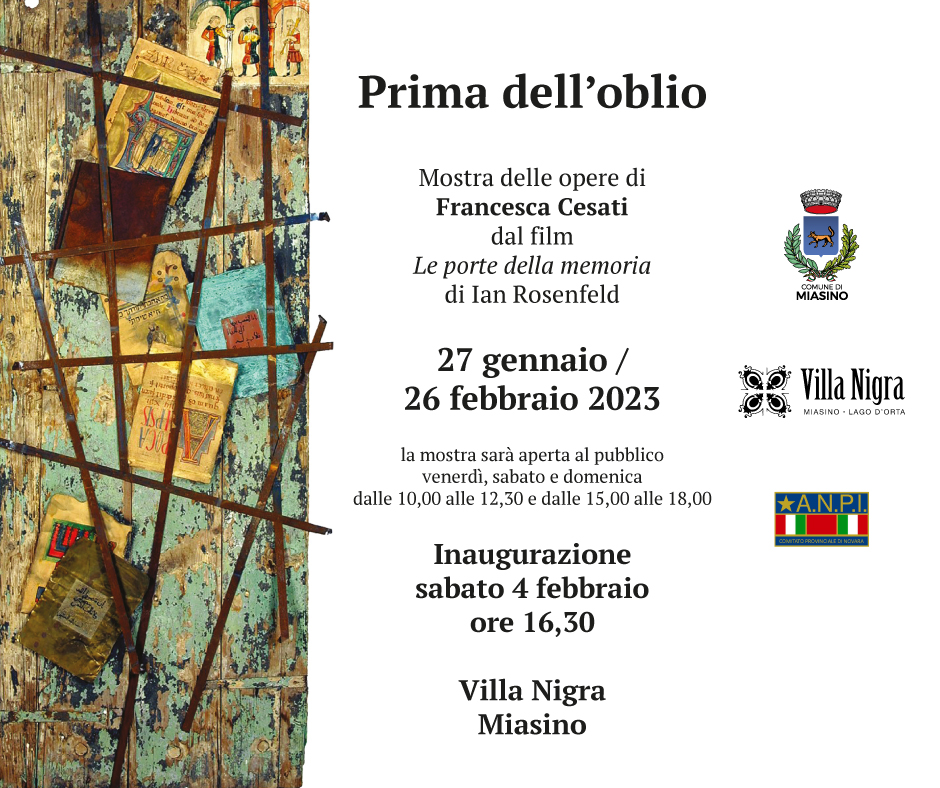La mostra Prima dell’Oblio è prorogata fino al 19/03

A grande richiesta, la mostra è prorogata fino al 19 marzo.
Nuove aperture: 4 e 5, 11 e 12, 18 e 19 marzo dalle 15,00 alle 18,00.
Una delle prime cose che colpisce chi guarda i lavori attinenti il lato artistico della vita di Francesca Cesati è il potente senso di dualità e la sintesi tra comunicazione visiva e verbale.
Questi aspetti, a lei famigliari e caratteristici della sua produzione, vengono – in questa installazione composta da 13 Porte commissionate per il film Le porte della memoria di Ian Rosenfeld – esplorati e connessi sia al genocidio che ebbe luogo in Europa tra il 1940 e il 1945 e al concetto di guerra anche slegato da un tempo specifico sia alla onnipresente, inarrestabile e umana ricerca di un perché.
La Mostra “Prima dell’oblio” sarà ospitata in Villa Nigra di Miasino sul Lago d’Orta sviluppandosi in un percorso che induce lo spettatore aldilà della sua esperienza personale, restituendogli i propri ricordi in una modalità più intensa e facendo interagire, in modo emozionante e commovente, la memoria collettiva e privata.
L’itinerario espositivo prevede una PRIMA SALA in cui è possibile visionare il film, mentre la SECONDA SALA, nella semioscurità, ospita le Porte sospese a 30 centimetri da terra e sistemate come un labirinto, in cui ogni spettatore si farà strada.
Sulle superfici già consumate dal tempo, gli interventi di Francesca Cesati raccolgono narrazioni e memorie di dimensioni ed epoche diverse: una rete arrugginita accanto ad una poesia d’amore, tre enormi chiodi costruiti 30 anni fa sulla superficie di una porta di fine ‘700, narrazioni accostate in differenti strati temporali.
Il percorso in questo “labirinto” è accompagnato da una colonna sonora: testi poetici, rumori, musica, suoni, canti si combinano offrendo un’ulteriore eco al viaggio del visitatore.
Oggi guardiamo queste Porte di “Prima dell’oblio” nella duplice luce sia della memoria che recano in sé e che generano sia come un invito a non desistere dal cercare una risposta, una chiave per interpretare l’esistenza, chiave che offra uno spazio di speranza per il genere umano aldilà di tutte le guerre, tutte le afflizioni, tutte le ingiustizie.
One of the first things that strikes those who look at the works relating to the artistic side of Francesca Cesati’s life is the powerful sense of duality and the synthesis between visual and verbal communication.
These aspects, familiar to her and characteristic of her production, are explored and connected both to the genocide that took place in Europe between 1940 and 1945 in this installation composed of 13 doors commissioned for the film “The Doors of Memory” by Ian Rosenfeld and to the concept of war even untied from a specific time and to the omnipresent, unstoppable and human search for a “why?”.
The exhibition “Before Oblivion” will be hosted in Villa Nigra of Miasino on Lake Orta, developing in a path that leads the viewer beyond his personal experience, restoring his memories in a more intense way and making him interact, in an exciting way and moving, the collective and private memory.
The exhibition itinerary includes a FIRST ROOM where it is possible to view the film, while the SECOND ROOM, in semi-darkness, houses “the Doors” suspended 30 centimeters above the ground and arranged like a labyrinth, in which every spectator will make their way.
On surfaces already consumed by time, Francesca Cesati’s interventions collect narratives and memories of different dimensions and eras: a rusty net next to a love poem, three enormous nails built 30 years ago on the surface of a late 18th century door, narratives juxtaposed in different temporal layers.
The path in this “labyrinth” is accompanied by a soundtrack: poetic texts, noises, music, sounds, songs combine to offer a further echo to the visitor’s journey.
Today we look at these Doors of “Before Oblivion” in the double light both of the memory they carry within them and which they generate and as an invitation not to give up on seeking an answer, a key to interpret existence, a key that offers a space for hope for mankind beyond all wars, all afflictions, all injustices.